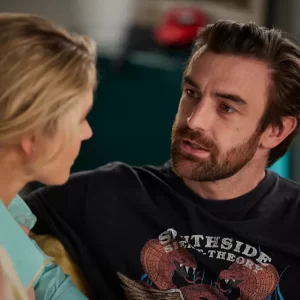Young and Restless spoilers reveal that Genoa City’s high-stakes power plays are heating up as Cane seemingly begins to unravel,
yet his rivals are closing in with precision, threatening to expose his deepest secrets.
Cane has spent months meticulously constructing his empire, maneuvering through the cutthroat business landscape of Genoa City with a mixture of charm, cunning, and cold strategy.
Yet, recent events reveal that the ground beneath him is less secure than he imagined. Alliances that once appeared fragile—Phyllis, Amanda,
and Billy—have begun to link in unexpected ways, forming the slow-tightening coils of a trap Cane never anticipated. Every subtle move he makes, from professing
a tactical retreat to leaking carefully curated rumors, is now under scrutiny. Cane’s attempt at stepping out of the limelight to execute behind-the-scenes maneuvers may have backfired, giving his adversaries the exact opportunity to map, predict, and counter his actions with the weapon he fears most: the systematic exposure of truth.

The tension ignites with a seemingly innocuous gesture: Phyllis inviting Amanda for a quiet drink. While their previous interactions had left rough edges, this meeting was no casual reconciliation. Phyllis, aware of Amanda’s principled nature, knew that earning her trust—even partially—would be enough to influence a critical turn of events. Amanda, methodical and discerning, does not take statements at face value. Her loyalty is measured, her friendships carefully calibrated. Phyllis’s goal was simple yet strategic: ensure Amanda remained an ally in the upcoming confrontation without revealing too much prematurely.
Meanwhile, Cane adopted the role of the weary schemer. He conveyed to Phyllis that he was abandoning his takeover plans, distancing himself from any “dirty work,” and hinted that she should let the news settle. On its surface, it seemed a confession from a man finally realizing the dangers of overreaching. But those familiar with Cane’s methods understood this was the perfect smokescreen. By projecting weakness, he sought to lull his opponents into complacency, softening legal scrutiny and lowering defenses. Behind the curtain, Cane’s empire was quietly being repositioned through shell companies, trusts, and opaque financial instruments—a labyrinth only he fully understood.
However, Phyllis was no longer the naive woman Cane once underestimated. Her years navigating Genoa City’s treacherous terrain had honed an instinct for verifying claims before surrendering any leverage. Instead of confronting Cane immediately, she brought Amanda into the loop. That decision activated a chain reaction that Cane could not foresee. Amanda, with her legal acumen, recognized that Cane’s overt withdrawal was unlikely genuine. If he truly intended to retreat, he would not need Phyllis to propagate the story. Instead, he was attempting to manipulate the narrative through her influence—a subtle yet powerful deception.
Amanda’s response was decisive. She crafted a two-tiered strategy. On the surface, Phyllis would allow the controlled leak of Cane’s “retreat” to a limited circle, maintaining the illusion of compliance. Beneath this, Amanda meticulously traced every legal and financial thread, tracking unusual amendments, shell entities, and financial transfers that revealed the hidden architecture of Cane’s plan. Every seemingly minor alteration—a last-minute addendum, an escrow account opened in secrecy, or a seemingly trivial contract edit—was scrutinized, forming a puzzle that only a skilled eye could assemble.
Complementing Amanda’s legal precision was Billy’s mastery of public perception. Accustomed to countering figures like Cane and armed with the instincts honed in the Abbott empire, Billy knew exactly when to feed distractions into the public sphere and when to remain silent to gather intelligence. Together with Phyllis, he created an intricate dance designed to peel back Cane’s smokescreen before it could consolidate into a full-scale deception.
The plan reached a pivotal moment when Amanda uncovered a short-term addendum transferring voting rights to a new legal entity—a seemingly small detail that illuminated Cane’s broader manipulations. While Phyllis played the role of confidante, luring Cane into revealing his intentions, Amanda quietly coordinated the factual evidence, preparing a structured case that could withstand scrutiny from authorities, partners, and regulators alike. Their synchronized efforts transformed Cane’s carefully constructed illusion into a compliance investigation, forcing the schemer into defensive maneuvers.
Phyllis, for her part, understood the stakes. Every movement in Genoa City is temporary, every victory fleeting. Her accomplishment was not in exposing Cane outright but in regaining control over her narrative. Supported by Amanda’s strategic foresight and Billy’s media acumen, Phyllis had secured a buffer against becoming a pawn in Cane’s games. In the city where reputations are as fragile as they are valuable, reclaiming agency can be more impactful than a complete triumph.
As Cane navigated a tense negotiation with Victor, the complexity of Genoa City’s power dynamics intensified. Victor, ever the master of leverage, probed Cane with calculated precision, testing his resources, timelines, and legal safeguards. Cane, forced to acknowledge the reality of his limited options, strategically presented himself as cooperative, while simultaneously cultivating covert contingencies. He initiated a phased partnership with Victor—slowing supply chains, implementing shadow pricing strategies, and establishing parallel networks—to maintain control over his long-term ambitions. Yet beneath this surface-level compliance, Cane’s clandestine operations continued, a delicate web designed to shift the balance of power at the opportune moment.
The genius of Cane’s maneuvering lies in subtlety. By creating off-the-radar financial flows, satellite production lines, and temporary contracts, he constructed a shadow empire within the visible one. Victor, with all his predatory instincts, could monitor the primary channels, but the hidden mechanisms of Cane’s network remained invisible—until the right signal triggered exposure. Meanwhile, the ripple effects of these moves manifested in cautious delays by partners, heightened scrutiny of contracts, and a city-wide undercurrent of suspicion that kept Cane’s competitors on edge.
Ultimately, the showdown was not explosive but methodical. Cane’s attempts at dominance clashed with Amanda, Phyllis, and Billy’s calculated resistance. The trio demonstrated that in a world dominated by deception, clarity, timing, and trust can wield more power than manipulation or intimidation. Every action—from Phyllis’s carefully placed inquiries, to Amanda’s legal unmasking, to Billy’s tactical media interference—served as a reminder that control is never absolute in Genoa City.
As the dust settles, Cane may still command his empire, but the balance has shifted. His opponents now operate with foresight, his moves are met with skepticism, and every decision carries heightened consequences. Phyllis has reclaimed her agency, Amanda has fortified her ethical and strategic influence, and Billy has learned the subtle art of guiding outcomes without spectacle. Together, they proved a fundamental truth: in a city fueled by ambition and duplicity, the right story, told at the right time to the right person, can dismantle even the most carefully orchestrated schemes.
In Genoa City, where words are weapons and alliances are transient, Cane’s latest miscalculation serves as a stark reminder: power is never secure, trust is fragile, and survival depends not on the loudest schemes, but on the clarity and timing of action.





